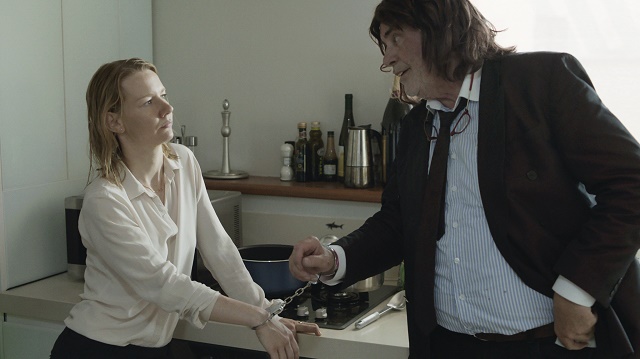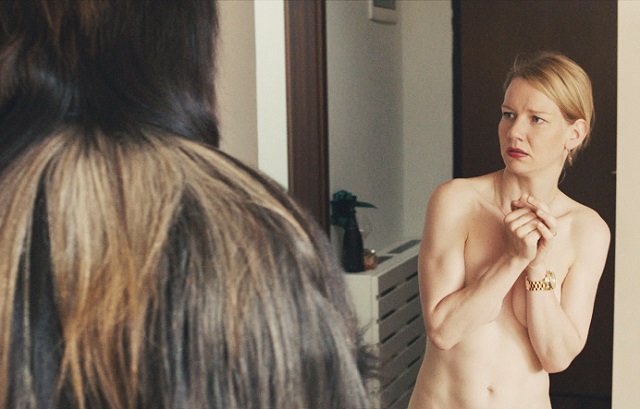
Sandra Hüller attends the ‘Toni Erdmann’ Laugh Gala screening during the 60th BFI London Film Festival (Photo by John Phillips/Getty Images for BFI)
One of the best films of the year, Toni Erdmann, is hitting British screens this Friday. After sweeping the board at the European Film Awards, the hilarious comedy has established itself as the one to beat in the Academy awards’ Foreign Language category. It has also scooped a total of eight nominations for our Rober Awards 2016 film poll.
To celebrate the eagerly anticipated release, this week we are publishing the two interviews our LFF correspondents had with director Maren Ade and lead actress Sandra Hüller, respectively. They took place during the London Film Festival, where it was rightly chosen as the gala for the Laugh strand.
We begin our Toni Erdmann double bill with a chat with its female protagonist, in which she gave us her views on women in film industry; the challenges of her role as Ines and her disgust for the people who trade with celebrities’ nude pictures in internet.
Maren Ade’s round table conversation will follow later on the week. (By Nicolas Raffin)
What interested you in the role?
There is often a big misunderstanding about that. I wanted to work with Maren, but I wasn’t sure about this specific role. It was a very complicated one and I had to learn a lot about Ines. It was also in a very special time in my private life. I have a little child, I knew that it would be a long shoot, that it would be abroad… I really wasn’t sure I was ready to do this. We talked and I eventually I couldn’t say no, but I was thinking “oh my god how could I ever possibly do this?”
Rober Awards: One of the things that stroke me about this role is how your performance conveys very well the feelings of today’s career women; how they need to be even tougher than men in order to push their career forward. Do you share those views? What is your opinion about gender equality at the moment in Germany and in the world?
Well, I think a lot of things have been achieved but there are still a lot of things to do. It’s a constant fight, and it’s still not usual to have both kids and a career in many countries. Even I have to defend myself at times and justify that I can’t work all the time because I have a child, or that I have to work under special conditions. It’s definitely not normal, and it’s still the case that men are not asked how they manage to have children in this job.
RA: Ines’ role is obviously a very demanding one. Some critics described this level of requirements as aggressive and wondered whether Maren Ade did not push you too far for certain scenes.
No, she did not push me too far, but she was definitely showing me that she expected a lot from me. The whole shooting was exhausting for everybody because it was very long and abroad, and in a world that we didn’t know. This whole business world is something really far from my own experiences. But…aggressive? There was nothing aggressive about this shoot and I think there is also nothing aggressive about the characters. In that sense, it was very unusual for me. I’m used to play characters that are very emotional and Ines is someone who doesn’t care about emotions. That was new to me: how to make my character believable without giving her the chance to show her feelings.
Don’t you think Toni Erdmann tells something about people that are very stressed in their work nowadays, and their career have too much importance? Your character is like that.
Yeah, but it only applies to certain people. It doesn’t apply to me for example, nor to many people around me. I think there are different kinds of people in the world. Some like to achieve a goal and really make an effort to do that, and some others think that things are happening by themselves; that they just need to make one decision after another. But of course, especially in the business that we are portraying, it’s a lot about achievement and being the best. There is a lot of competition there.
But Ines is not happy with her job.
Why do you think so?
Well, she doesn’t seem to be happy! We see her crying…
She’s focused. She tries very hard to get what she wants. I always find the question of the father, “Are you happy?”, a bit rude. He would never have asked that to a son! What does he mean with “happiness”? It only comes back to why she doesn’t have children or a family. We discover Ines in a certain stormy period of her life where things are really getting out of control, but it doesn’t mean it was always like that or that it will always be like that. And that’s where the father comes in and makes it even worse at the beginning. I don’t see her as unhappy.

RA: One of the things that you can read in the film is the generational conflict of values between the dad and her daughter. Is this something you can identify with? Does that match your view of society?
No, I personally can’t relate. I have a vey nice and warm relationship with my parents. We also don’t fight about politics, we have the same opinions. Maren created this gap between Ines and her father especially for the film, and she wanted to picture the biggest possible gap. I’m not sure it is something that is going on everywhere. Maren often talks about how the post-war generation has another approach to work and to success than their children. But it could also be that Ines just didn’t like her father giving up on everything and just sitting around waiting. Maybe she thought at a certain point of her life: “I am going to achieve something by myself. Whatever that is.” I cannot judge the decision that she makes.
RA: Coming back to the shooting process: Maren works with very long takes, and one of the risks of long takes is to loose the spontaneity of the actors. How did you react to that?
Well, it pays off in the end, as you can see. It’s really exhausting, but at the same time it got me to points where I would have never imagined I could ever come to as an actress. It starts getting interesting at the point when you can’t control anything anymore. After 17 takes with slight variations you are exhausted and you feel that there is nothing more to get from this scene. But there obviously is something more that you didn’t know about. So, yeah, it’s both very interesting and exhausting.
How close did you work with the German consultant that helped you prepare your role?
She came at some rehearsals in Berlin when we were doing the business sections of the film. I guess she was bored because we were really slow! We also went to Romania to observe her in her workspace. I saw a presentation that she was doing and we talked a lot with her. I really enjoyed her presence. She did a very good job: she was very focused but also very warm.
RA: Does Toni Erdmann make you want to focus more on films now?
I’m going to keep doing the same thing I have always done: just do what I like. And if it’s a film, a film; if it’s theater, theater, if it’s nothing, then nothing! I won’t change anything.
RA: What about a Toni Erdmann 2?
No! What would that be about? I have no idea. The life after the film’s? The same thing in Singapore? Probably!
RA: There are two of your previous roles I can particularly remember in films that got international releases. One was Amour Fou (2014) and the other was Requiem (2006). They are very diverse roles. Which of your roles shaped you the most as an actress? Which ones were the most challenging? and the easiest?
They were all challenging and I wasn’t confortable with any of them. I learned with every single work that I’ve done. I learn all the time. That’s what I like about this job! I have really dedicated myself fully to the movies I’ve made. There were all love decisions, there is not one career move in all of that. Maybe you can also watch Brownian Movement (2010) once, it’s also in English, and Madonnen (2007), which came straight after Requiem.
RA: Did the feminist aspect of Ines attract you to the role?
I especially wanted to find out how Ines is managing it. And if she was really as tough as she appears.
And what did you find out?
She is! And she will rule the world one day. She can do it all.
I heard the casting process was quite long.
It was long because Maren had to find the right combination. She didn’t cast actors on their own but always in a father-daughter combination. So I met a few fathers and Peter met a few daughters. We spent almost a whole day together in some apartment with a camera and played some scenes -Not from the movie though! Maren doesn’t like to take written scenes out of the script for casting, which I totally respect and understand. So she writes scenes especially for the casting.
RA: Were there any particular scenes that took a bigger effort from you? I’m thinking about some of the more explicit scenes or even the nudity one. I know that Germans have a more natural approach to nudity…
If I had thought for a second about what would happen to those pictures on the internet, I couldn’t have done this. It’s just crazy! This particular scene was absolutely necessary for the film. It was absolutely necessary for the character of Ines. I never questioned the fact that I would do it. But if I was to meet any of the people that create those special websites for naked celebrities in films, I would beat the hell out of them! It’s terrible; It’s disrespectful; it’s nocive for the art that we do and it’s a total misunderstanding of what we are doing.
RA: It spoils something that it’s actually very beautiful! It’s a cathartic moment in the film where every character reveals themselves for what they are.
As you can see, it makes me very angry! But it wasn’t the most difficult part of the film. The most difficult scenes were the business ones and to make people believe that Ines could actually do the job. I felt that if Ines was not able to be a good consultant, then the whole story development wouldn’t work and the father would be right. She would be a cheater.
Tony Erdmann is released in the UK on February the 3rd. Don’t miss it!
